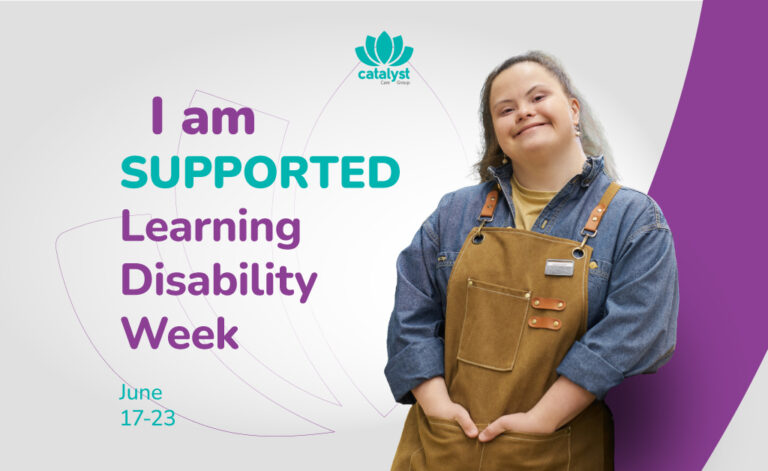Outcome-focused care and support services ensure that people with lived experience and their families or carers are supported to achieve their goals and aspirations and live the best lives possible. At Catalyst Care Group, we transform challenges into opportunities for people to thrive in the community and reach personal outcomes.
What is Defined as an ‘Outcome’?
Personal outcomes describe activities people want to be engaged in or goals they want to achieve. Outcomes will differ from person to person or from child to child because every person is unique, and they are based on supporting people’s overall well-being.
Outcomes are realistic goals that an individual with lived experience, and their care practitioner work together to achieve. Whether it’s a simple daily routine or a more confident activity, it’s our priority to help people become the best versions of themselves with our outcomes-focused approach.
Typical examples of personal outcomes include:
- “I want to spend more time with the other kids at school.”
- “To be able to go to the cinema with my brother and mother at least once a month.”
- “I want to go to cooking classes to cook for myself and my loved ones.”
With outcome-based practice, we are committed to driving positive changes by supporting people in an empowering way so that they can develop confidence, independence and a sense of purpose.
What is an Outcome-Based Approach?
In health and social care, an outcomes-based approach focuses on understanding what matters to people and supporting their efforts to reach their goals. The outcomes-focused approach is central to the personalised and human rights-based model of care, which involves working with people rather than working for people.
At Catalyst Care Group, our care and support services revolve around identifying what’s really important to a person and empowering them to reach a personal outcome.
Our outcomes-focused approach is developed and firmly intertwined with the following principles:
- People are the masters of their lives, and they know best what gives them a sense of purpose, meaning and well-being.
- People want to be engaged in activities that matter most to them in their own way.
- Every person has unique strengths, skills and abilities that need to be recognised and acknowledged.
- Our care and support journey begins by identifying a person’s outcomes and creating person-centred plans focused on achieving and measuring outcomes.
- People’s family, friends and the local community are involved as much as possible in the outcomes-based support planning.
- Meaningful conversations and honest relationships are the key to identifying outcomes.
We follow the same set of principles for every person who receives support under Catalyst Care Group’s house of brands, whether they are children, young people or adults.
Developing Outcome-Based Practice
Positive outcomes can only be achieved through holistic and personalised practices carefully developed by a group of experienced healthcare professionals. For that purpose, we have an internal team of Positive Behaviour Support (PBS) and speech and language therapists.
Positive Behaviour Support is the foundation of our person-centred approach to delivering care and support services. In our experience, PBS has shown incredible results when implemented to support children and adults with autism, learning disabilities and complex care needs. We use a strengths-based approach and positive risk-taking as a part of our PBS strategy to develop outcome-based practice.
In addition, we’ll explain the key elements of the outcomes-based approach.
Building Relationships
Building solid and honest relationships with the people we support is central to achieving positive outcomes. Transparent communication instils trust, hope and a sense of security for people receiving care and support, empowering them to build confidence, independence and life purposes.
We believe in people’s strengths and skills and positive reinforcement strategies that focus on what people CAN do to achieve great outcomes and live their best lives.
Setting Outcomes
The outcome-based practice starts with caring and quality conversations to understand what truly matters to people. A good conversation is where a service user feels heard, valued and understood. When setting the outcomes, we need to be focused on people’s strengths and approach the outcomes with the following elements.
Outcomes should be:
- Guided by the person’s unique desires, needs and aspirations
- Realistic, providing a sense of security and confidence to manage and adapt to changes and to keep hope and the feeling of having control
- Attainable, embracing all the personal skills and resources within the family, social and community circles
- Purposeful, involving a person’s deepest concerns and challenges
- Evolving and transforming, striving to achieve the best outcomes possible
Impact of Outcome-Based Approach on Individuals
The outcomes-focused approach creates a sense of well-being and positive changes in all aspects of a person’s life, including mental, physical, emotional and social welfare. By implementing the positive outcomes approach, we can empower a sense of well-being in:
- Interactions and relationships
- Grow self-awareness
- Support in gaining confidence
- Foster a sense of purpose
- Make useful contribution
- Empower people to feel love and be loved
- Allow achieving great things in life
To achieve positive outcomes, we must involve people’s families and carers through collaborative work. With the help of co-production, we can find new ways to collaborate and exchange ideas, experiences and resources to help deliver better person-centred care.

Benefits of an Outcome-Based Approach in Social and Health Care
An approach that prioritises the service user focuses on outcomes and has a range of benefits for people with complex care needs. Below, we have selected the main advantages of implementing an outcome-based practice:
- Improved physical well-being and behaviour
- Improved mental and emotional health
- Foster a secure and caring environment
- Provide care and support beyond basic needs
- Encourage active participation in different activities
- Access to healthy social interactions and friendships
- Autonomy and freedom of choice about daily routines and care plans
- Feel respected, dignified and valued
- Unique needs are met and fulfilled
- Being treated as a person
- Sense of joy, fulfilment and belonging in the community
We are committed to providing consistency and continuity of care to ensure the best possible outcomes for the people we support.
Catalyst Care Group Is Applying an Outcome-Based Approach in Social and Health Care
Catalyst Care Group is committed to excellence in providing care with continuous improvement in our care and support practices. Our goal is to support the transforming care agenda and ensure that every individual with complex care needs has access to humanised and person-centred care.
We are focused on building capable environments where individuals can flourish, have their needs fulfilled, and have great connections to participate in activities that are meaningful to them and achieve positive outcomes.
Contact us today to collaborate on creating a brighter future for every individual with complex care needs.










